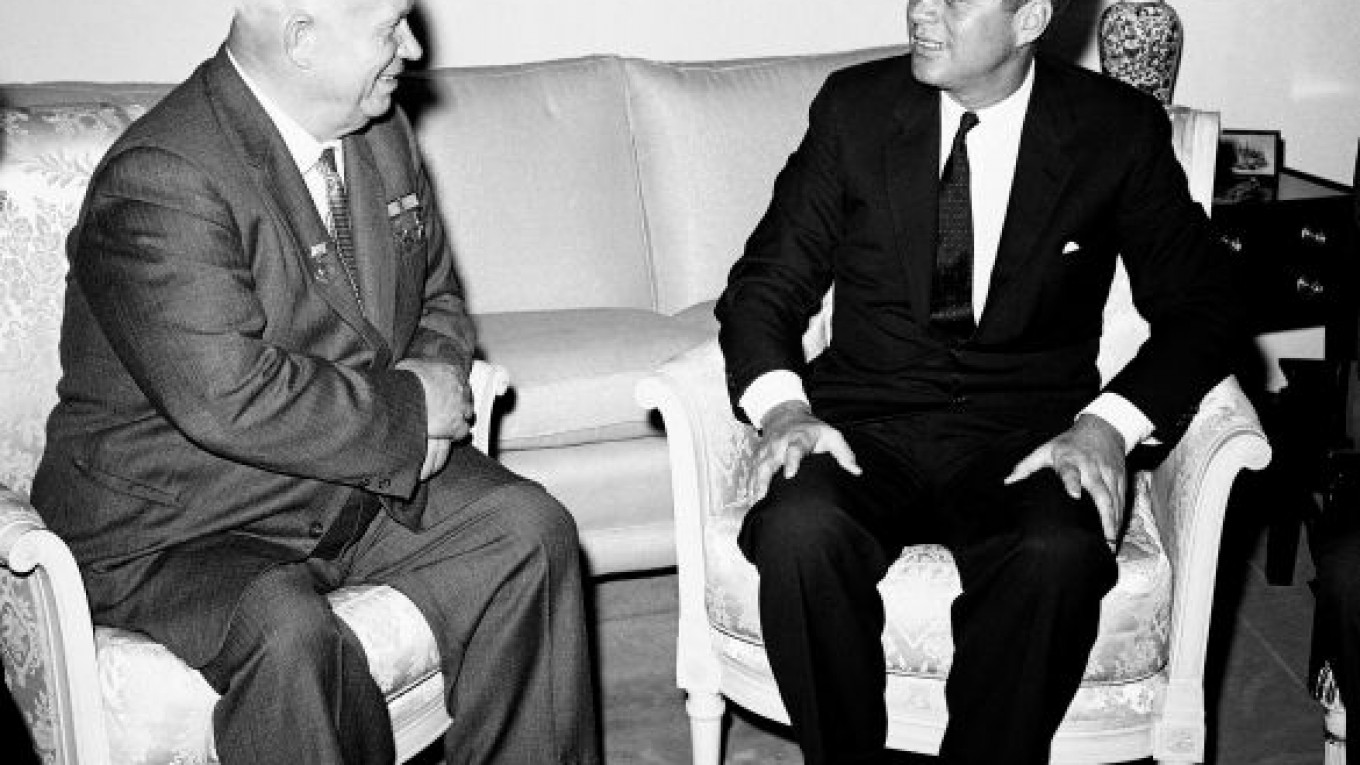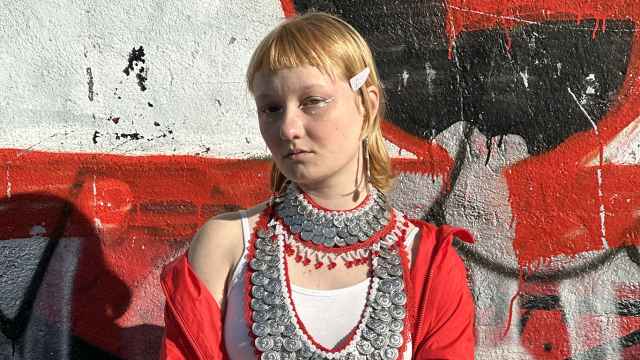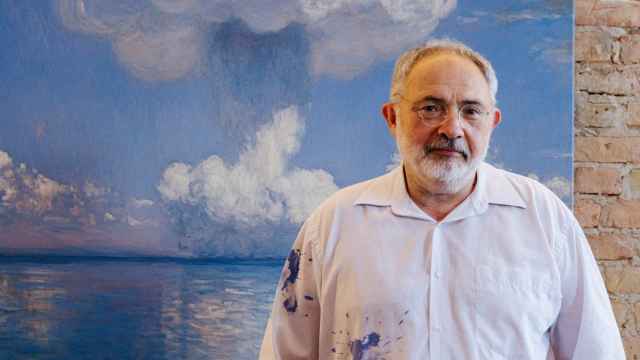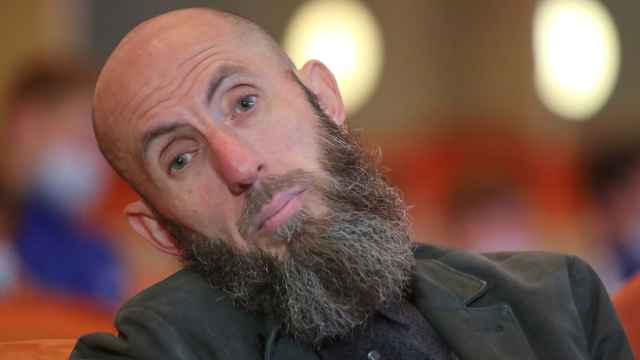WASHINGTON — Fifty years after the Cuban missile crisis, the U.S. National Archives has pulled together documents and secret White House recordings to show Americans how President John F. Kennedy deliberated with advisers to avert nuclear war.
A new exhibit, "To the Brink: JFK and the Cuban Missile Crisis," opens Friday to recount the showdown with the Soviet Union. While the recordings have been available to researchers for years, this is the first public showcase of Kennedy's recordings to replay tense conversations about national security from the Oval Office and Cabinet Room.
In the fall of 1962, Soviet Premier Nikita Khrushchev ordered a secret deployment of nuclear missiles in Cuba that were soon detected by U.S. spy planes. On Oct. 16 that year, Kennedy was briefed on photographic proof of the missile sites being developed.
U.S. officials determined from the size of the images that the medium-range missiles would be able to reach Washington, Dallas, Cape Canaveral, Florida, or other sites within 1,600 kilometers of Cuba, likely within minutes. Soon after they learned of longer-range missiles that could reach most of the country.
Kennedy's team debated how to respond but agreed the missiles would not be tolerated.
The ensuing standoff with Khrushchev over 13 days became "the most dangerous moments the world has ever faced, either before or since — the closest we came to nuclear destruction," said historian and journalist Michael Dobbs, who helped preview the National Archives exhibit.
Both Kennedy and Khrushchev had made mistakes leading to this point, Dobbs said. Khrushchev had gambled by deploying nuclear weapons so far from the Soviet Union on the U.S. doorstep. And Kennedy fumbled his first major foreign policy crisis at the Bay of Pigs with the failed effort to topple Fidel Castro. The Kennedy administration's campaign called Operation Mongoose to overthrow Castro triggered a dramatic reaction from the Soviets.
The archives display some once-secret documents for the first time, including diplomatic cables in Russian with Khrushchev's signature as he traded secret messages with Kennedy and personality sketches of Khrushchev and Castro by the CIA. Khrushchev is described as "an obtuse, rough-talking man" but shrewd and as having "a touch of a gambler's instinct."
There were also emergency plans developed for White House staff in case of an attack on Washington. One special assistant to the president was directed to go to Camp David in rural Maryland in case of attack.
"You don't really have to be an expert or Cold War historian to grasp the stark human drama that this story really is," said Stacey Bredhoff, curator of the Kennedy Presidential Library and Museum in Boston and organizer of the exhibit.
The story from 50 years ago also could be a lesson for the future.
"I think one thing that this exhibit points out is that a nuclear confrontation can happen and it almost did happen. This happened almost 50 years ago, and it ended well," Bredhoff said. "But what we cannot take for granted is that these events can get beyond the control of leaders."
The archives lay out the crisis in chronological order with sounds of heated debates in the White House over whether to respond with military force. As Kennedy leaned toward a blockade order to prevent Soviet ships from sending more military supplies to Cuba, some military advisers thought it a weak response. Still, he prepared for the worst.
A draft speech was prepared that began, "This morning, I reluctantly ordered the armed forces to attack and destroy the nuclear buildup in Cuba." It was never delivered.
As the blockade went into effect, Soviet ships approached, along with submarines, leading to tense moments. Kennedy ordered small "depth charges" to be fired from U.S. ships to encourage the submarines to surface. What he didn't know was they were carrying nuclear-tipped tactical missiles and came close to using them.
"One of the things that struck me … was the extent to which the president of the United States didn't really know and didn't fully control what was happening on the ground," said Dobbs, who has written a book on the crisis. "He didn't know that the Soviet Union had 42,000 troops on Cuba, ready to resist an American invasion."
On Thursday, the National Archives and Kennedy Library were to release more than 2,700 pages of material from the Robert F. Kennedy papers that are newly declassified, including documents related to the Cuban Missile Crisis. Library director Tom Putnam said they include the attorney general's notes from national security meetings during the crisis and drafts of a memo he sent to the president after meeting with the Soviet ambassador.
The exhibit is on view in Washington until February and then moves to Boston's Kennedy Presidential Library in April.
Related articles:
A Message from The Moscow Times:
Dear readers,
We are facing unprecedented challenges. Russia's Prosecutor General's Office has designated The Moscow Times as an "undesirable" organization, criminalizing our work and putting our staff at risk of prosecution. This follows our earlier unjust labeling as a "foreign agent."
These actions are direct attempts to silence independent journalism in Russia. The authorities claim our work "discredits the decisions of the Russian leadership." We see things differently: we strive to provide accurate, unbiased reporting on Russia.
We, the journalists of The Moscow Times, refuse to be silenced. But to continue our work, we need your help.
Your support, no matter how small, makes a world of difference. If you can, please support us monthly starting from just $2. It's quick to set up, and every contribution makes a significant impact.
By supporting The Moscow Times, you're defending open, independent journalism in the face of repression. Thank you for standing with us.
Remind me later.






